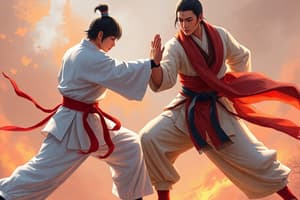Podcast
Questions and Answers
Which term refers to a black belt in Taekwondo?
Which term refers to a black belt in Taekwondo?
- 1st dan (correct)
- 1st geup
- 2nd geup
- 4th geup
What is the appropriate term for 'start' in Taekwondo?
What is the appropriate term for 'start' in Taekwondo?
- Shi jak (correct)
- Keo man
- Baro
- Kihap
What does 'Dojang' refer to?
What does 'Dojang' refer to?
- Training hall (correct)
- Forms
- Instructor
- Sparring
Which of the following terms means 'self-defense' in Taekwondo?
Which of the following terms means 'self-defense' in Taekwondo?
Which command is used to instruct a student to pay attention?
Which command is used to instruct a student to pay attention?
In Taekwondo, what does 'Taekwon' translate to?
In Taekwondo, what does 'Taekwon' translate to?
Flashcards are hidden until you start studying
Study Notes
Korean Terminology in Taekwondo
Greetings
- Annyeonghaseyo (): Hello
- Annyeonghi kaseyo (): Goodbye
- Joheunhamnida (): Respectful greeting (used by instructors)
Basic Commands
- Charyeot (): Attention
- Kyongye (): Bow
- Shi jak (): Start
- Keo man (): Continue
- Kihap (): Ki-hap (energetic shout)
- Baro (): Stop
Training Terms
- Dojang (): Training hall
- Sabom nim (): Instructor
- Kyorugi (): Sparring
- Poomsae (): Forms
- Kyokpa (): Breaking
- Hosin sul (): Self-defense
Belt Ranks
- 10th geup (): White belt
- 9th geup (): White belt with yellow stripe
- 8th geup (): Yellow belt
- 7th geup (): Yellow belt with green stripe
- 6th geup (): Green belt
- 5th geup (): Green belt with blue stripe
- 4th geup (): Blue belt
- 3rd geup (): Blue belt with red stripe
- 2nd geup (): Red belt
- 1st geup (): Red belt with black stripe
- 1st dan (): Black belt
Other Terms
- Taekwon (): Foot, fist, way
- Do (): Way, discipline
- Kuk (): Country, nation
- Gi (): Uniform
- Dobok (): Uniform
Korean Terminology in Taekwondo
Greetings
- Annyeonghaseyo is a formal way to say "hello"
- Annyeonghi kaseyo is a formal way to say "goodbye"
- Joheunhamnida is a respectful greeting used by instructors
Basic Commands
- Charyeot means "attention" and is used to get students' focus
- Kyongye means "bow" and is a sign of respect
- Shi jak means "start" and is used to begin training
- Keo man means "continue" and is used to resume training
- Kihap is an energetic shout used to express power and focus
- Baro means "stop" and is used to halt training
Training Terms
- Dojang is the term for a taekwondo training hall
- Sabom nim is a term used to address an instructor
- Kyorugi refers to sparring in taekwondo
- Poomsae refers to forms or patterns in taekwondo
- Kyokpa refers to breaking in taekwondo
- Hosin sul refers to self-defense techniques in taekwondo
Belt Ranks
- The 10th geup is a white belt, the beginning rank in taekwondo
- The 9th geup is a white belt with a yellow stripe, marking progress towards the next rank
- The ranks progress in sequence, with each rank adding a new stripe or color, until the 1st dan black belt
Other Terms
- Taekwon literally means "foot, fist, way"
- Do means "way" or "discipline" and is a core concept in taekwondo
- Kuk means "country" or "nation" and is used in the name of the martial art
- Gi and doboke are terms for the taekwondo uniform
Studying That Suits You
Use AI to generate personalized quizzes and flashcards to suit your learning preferences.




